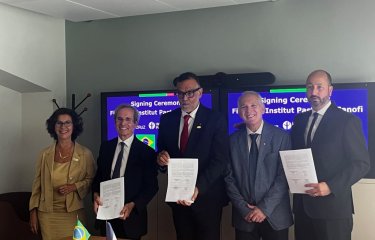The 8th ceremony in honour of the young graduates who have completed their thesis at the Institut Pasteur during the academic year 2019-2020 was held on December 4th 2020. Due to the Covid-19 pandemic, the event took place in visio and thus allowed a greater number of young doctoral students from the Institut Pasteur International Network (IPIN) to join this special event. This ceremony, like the previous ones since 2013, continues to highlight the excellence of the international scientific community at the Institut Pasteur. This year, therefore, nine young researchers from the IPIN were present among the young Pasteurian scientists.
The ceremony was introduced by Stewart Cole, President of the Institut Pasteur, and began with an exceptional lecture by the Nobel Prize winner for Chemistry 2020, Professor Emmanuelle Charpentier. Pierre-Marie Girard, Vice-President of International Affairs at the Institut Pasteur, presented the graduates of the Institut Pasteur International Network with Monica Sala, Education Director at the Institut Pasteur.
The diversity of the international network in the spotlight.
The Network's PhD students come from European, African, Asian and Pacific institutes and have carried out their research on topics as wide-ranging as epidemiology, research and development of new treatments, parasitology, bacteriology in the service of global public health.

Laetitia LESIRE
PhD in Biology, Medicine and Health specialized in biomolecules, pharmacology and therapy.
Drugs and Molecules for Living Systems Lab (INSERM U1177), University of Lille,
Institut Pasteur de Lille.
Characterization of the mechanism of action of small molecules in cancer
Multiple myeloma is a cancer characterized by excessive and abnormal proliferation of plasma cells in the bone marrow. Recent therapeutics advances have increased patient survival but this disease remains incurable. It is necessary to validate new modes of actions and to develop effective treatment combinations. The laboratory discovered a series of chemical compound able to boost the cytotoxicity induced by carfilzomib, a proteasome inhibitor, in several cancer cell lines. The compounds alone are not toxic at the concentrations used. This is why we talk about a boost effect. During her PhD, Laetitia investigated the mechanism of action of these molecules. By multiplying experimental approaches, she was able to formulate hypotheses on the mechanism of action opening up new trails of understanding. This PhD was financed by a doctoral grant from University of Lille.
Currently, Laetitia has started a postdoctoral fellow on a new project at the Institut Pasteur de Lille, in the Drugs and Molecules for Living Systems research unit.

Marilena TSALA
PhD in Medical Microbiology, National and Kapodistrian University of Athens
Department of Microbiology, Medical School, National and Kapodistrian University of Athens
Laboratory of Bacteriology, Hellenic Pasteur Institute
Antibacterial activity of tigecycline, meropenem and colistin triple combination therapy against Klebsiella pneumoniae isolates using an in vitro pharmacokinetic/pharmacodynamic simulation model
Marilena Tsala graduated from the Department of Chemistry of University of Crete, Greece in 2009 and she obtained her PhD in Medical Microbiology from the Medical School of National and Kapodistrian University of Athens in collaboration with the Hellenic Pasteur Institute in 2020. She has published a number of papers in peer reviewed journals. Her main research interests are, preclinical in vitro models of bacterial infections, pharmacokinetics and pharmacodynamics of antibacterial drugs and in vitro antimicrobial susceptibility testing.
Marilena Tsala is, today, a Clinical Trial Coordinator, working with SANOFI S.A. in the department of Rare Diseases and Gene Therapy, based in Royal Free Hospital in London, UK.

Serges TCHATCHOUANG
PhD in Biochemistry specialized in Molecular Microbiology, Faculty of Science - University of Yaounde 1
Bacteriology Unit,
Pasteur Center in Cameroon
Haemophilus species in Respiratory tract infections: molecular epidemiology
Haemophilus species are among the main etiological causes of respiratory infectious diseases, however little information is available with regard to its occurrence in Cameroon. Serges’ thesis aimed to characterise them by defining their antibiotic resistance profile, serotype and genetic diversity. He isolated 3 different Haemophilus species (influenzae, haemolitycus and parainfluenzae) from patients with respiratory tract infections in Cameroon and showed that in Yaoundé, these circulating species present a great genetic diversity. Serges found that strains of Haemophilus were overwhelmingly resistant to two categories of antimicrobials: sulphonamides and β-lactam antibiotics. His work shows the importance of establishing antimicrobial stewardship in Cameroon since more than half of the study population was under antibiotic treatment before clinical diagnosis.
Serges Tchatchouang is a researcher at Pasteur Center in Cameroon and continues his work on development of molecular diagnostic assays and genetic analysis of bacteria.
This PhD was supported by traineeship grants Calmette and Yersin funded by the Institut Pasteur Department of International Affairs, the Department of Health and Human Services (DHHS, USA) and the Pasteur Center in Cameroon.

Sitraka RAKOTOSAMIMANANA
PhD in Microbiology, Université d'Antananarivo and Université de La Réunion
Plague unit and Epidemiology and Clinical Research unit
Institut Pasteur de Madagascar
Plague in Madagascar: spatialization, people’s knowledge and perceptions of accessibility to healthcare
Sitraka Rakotosamimanana is a geographer. Since 2009, he has focused his research on the socio-spatial aspects of infectious diseases, such as tuberculosis and plague, in Madagascar. He realized his PhD in two research units of the Institut Pasteur de Madagascar: the plague unit and the epidemiology and clinical research unit. During his thesis, he aimed to highlight the association between human behaviour and the heterogeneity of the epidemiological expression of the plague in space. Thanks to different approaches combining qualitative and quantitative approaches, he has identified the environmental and socio-spatial behavioural factors that explain the heterogeneity of the situations facing the plague in Madagascar. This opens perspectives in the fight against the plague on the island.
Currently Sitraka Rakotosamimanana is a geographer in the epidemiology and clinical research unit and he is responsible for a training course in geographic information systems, as part of a project. Sitraka has the ambition to pursue its research on the socio-spatial aspects of infectious diseases and wants to share its experiences in higher education.

Rila RATOVOSON
PhD in Microbiology, Université de la Sorbonne
UR - 15 Demosud : Institut national d'études démographiques and epidemiology and Clinical Research Unit
Institut Pasteur de Madagascar
Mortality and Health in Madagascar: health transition in the Moramanga district
Rila Ratovoson is a Physician and works in the Epidemiology and Clinical Research unit at Institut Pasteur de Madagascar. Since 2012, she is in charge of a population cohort in the Moramanga district of Madagascar, where she carried out her thesis study. It focused on mortality and causes of death in the population of this zone, with particular attention to the burden of non-communicable diseases and according to place of residence. This thesis work, at the intersection between epidemiology and demography, has highlighted that the infant and child mortality rate, estimated at 52‰ in 2016, remains fairly similar to the national level and that among children under 5 years of age, the causes of death are dominated by infectious diseases, perinatal and nutritional causes, especially in rural areas. It also pointed out that the advantage of children living in the city remains insignificant when it comes to deaths from non-communicable diseases and accidents. The main conclusion of this work is that it is still necessary, in public health, to take into account, through prevention and better management, the burden of non-communicable diseases in the entire population at all ages.
Rila Ratovoson pursues her studies on the themes of mortality and causes of death in Madagascar at Institut Pasteur de Madagascar as Physician and researcher.

Camille ROESCH
PhD in Evolution of Infectious Systems, Université de Montpellier
Malaria Molecular Epidemiology Unit
Institut Pasteur du Cambodge
Invasion and development of Plasmodium vivax in human reticulocytes: phenotype genotype association of the response to inhibitors
Camille Roesch obtained her Master Degree of Drug Design along with her Engineer Degree in Biotechnology in Strasbourg (Ecole Supérieure de Biotechnologie de Strasbourg (ESBS)) France. After her six months of Master internship in the Malaria Molecular Epidemiology unit at Institut Pasteur du Cambodge, she took the opportunity to pursue her work on Plasmodium vivax as a PhD student within this team.
Plasmodium vivax is the most widespread of the five Plasmodium species able to infect humans and is responsible for the majority of malaria cases outside Africa. Thus, Camille’s PhD aimed to improve the understanding of the mechanisms of invasion and development of P. vivax in humans. Camille Roesch has studied the mechanisms of invasion of this parasite in red blood cells. She has also characterized the susceptibility of Cambodian clinical isolates of P. vivax to different antimalarials.
Camille is currently continuing her work on malaria at Institut Pasteur du Cambodge, focusing on P. falciparum resistance to artemisinin-based combination therapy in South East Asia.

Mélissa MAIRET-KHEDIM
PhD in Microbiology, Université Paul Sabatier,
Malaria Unit,
Institut Pasteur du Cambodge
Resistance of Plasmodium falciparum to Artemisinin-Based Combination Therapy in Cambodia and Cameroon: epidemiology, mechanisms and new therapeutic options
Mélissa Mairet-Khedim spent a lot of time observing “things” under a microscope. It started as a game, and finally led her to study microbiology. During her Master in immunology and infectious diseases, she started to work on Plasmodium falciparum, the parasite causing Malaria. She discovered a fascinating, but also detestable parasite, that she wanted to fight. Therefore, she studied parasite resistance to antimalarial drugs. She had the chance to do her PhD in Cambodia, the epicenter of Plasmodium resistance in the World, to study this topic. Her work made her realize how smart and vicious this parasite is, always finding new strategies to escape antimalarial drugs action. As the saying goes, be close to your friends but even more to your enemy… That is why Mélissa continues to learn more about Plasmodium and its resistance mechanisms through a postdoc at Institut Pasteur, in Paris.

Zhenghui HUANG
PhD in Microbiology, University of Chinese Academy of Sciences
Human Parasite Molecular and Cell Biology Unit
Institut Pasteur of Shanghai – Chinese Academy of Sciences
Study of transcriptional regulation of key pathogenic genes in Plasmodium falciparum and the development of antimalarial drugs
Zhenghui Huang is graduated from Institut Pasteur of Shanghai - Chinese Academy of Sciences. He realized his PhD in the Human Parasite Molecular and Cell Biology Unit, under the supervision of Pr. Lubin Jiang. His research project focused on the study of the transcriptional regulation of key pathogenic genes in Plasmodium falciparum, the deadliest species of Plasmodium that causes malaria in humans. The data obtained during his thesis contribute to the development of antimalarial drugs.
Now he is working as a postdoc in Institut Pasteur of Shanghai, focus on the development of anti-malarial drug and the diagnostic methods for malaria.

Emilie BIERQUE
PhD in Microbiology, Université de Nouvelle-Calédonie
Research and expertise unit of leptospirosis
Institut Pasteur de Nouvelle-Calédonie
Ecological and microbial determinants of the environmental component of leptospirosis in New Caledonia
Emilie Bierque’s PhD took place in the context of revision of Leptospira phylogeny. Some bacteria from this genus are pathogenic and responsible of leptospirosis, an environmental zoonosis infecting humans. More than 20 new species isolated from soil samples, have been described for three years, allowing considering the soil as the original habitat of leptospires.
Emilie brought elements supporting the hypothesis considering the soil as the environmental habitat of pathogenic leptospires, which would then be resuspend during heavy rain. Furthermore, her studies confirmed the ability of pathogenic leptospires to survive more than one year in nutrient-free freshwater and revealed the preservation of direct virulence after this long-term survival was shown. Also, she has identified several environmental elements, appeared to favor the survival of pathogenic leptospires.
These studies contribute to better understand the environmental transmission of leptospirosis, and thus offer better strategies for the control and prevention of this potentially fatal disease.
She is currently looking for a position of engineer in research institutes and in private companies here in New Caledonia. She would really like to participate in the improvement of scientific knowledge on issues specific to this unique territory.
This PhD was supported by a doctoral grant of the Calmette and Yersin programme, funded by the Institut Pasteur - Department of International Affairs.





